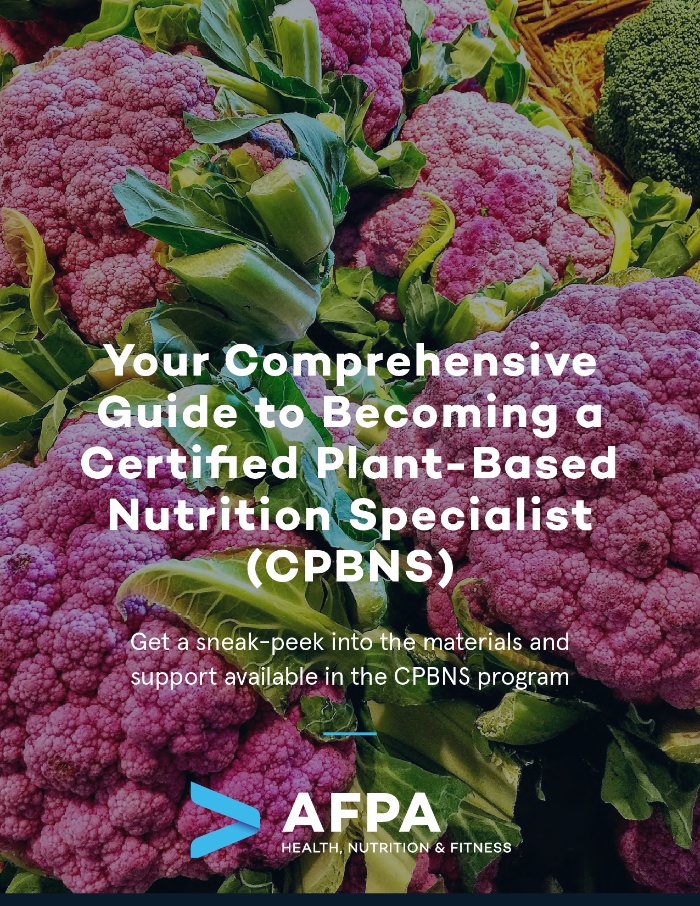There is not a more contentious subject around the discussion about plant-based diets than the protein debate. Skeptics question the quality and quantity of proteins from plant foods and whether they readily meet people’s protein needs.
In this article, we review the evidence behind whether protein needs are met with plant-based diets so coaches and health professionals can readily answer any questions their clients may have.
First Things First…
What a Plant-Based-Diet Is and Isn’t
Plant-based diets are often equated with veganism, but technically, they aren’t the same thing.
The definition of a plant-based diet varies. Some plant-based diets exclude all animal products, while others get a significant part of their nutrients from vegetables, fruits, cereals, and legumes while occasionally consuming some animal products.
- Veganism is about more than not eating foods that come from animals; as researcher Jessica Greenebaum published in Food, Culture & Society, even though vegans hold a variety of different norms and values, “identifying as a vegan is a public declaration of one’s identity, morals, and lifestyle. Veganism is more than diet; it is a philosophy and ethic.”
- Vegetarianism is a diet-focused term that refers to a diet where meats are excluded from the diet, but some dairy or eggs may be included. Since vegetarian dietary patterns vary in terms of food inclusions and exclusions, there are inconsistencies in studies that evaluate the health effects of vegetarian diets.
In short, people who follow plant-based diets may identify as vegans or vegetarians, or they may not identify with either.
This article will focus on the definition of plant-based diets, where all animal-based foods are excluded, to explore what the research shows regarding the possibility of meeting protein needs through plant foods.

Become a certified expert on plant-based nutrition and help others discover how this way of eating can lead to vibrant health and well-being.
What Are Proteins?
Proteins are large molecules that vary significantly in size, structure, and function. They are made up of small components called amino acids. Our body can make some amino acids from other components, but others must be consumed in the diet. The amino acids that our bodies cannot make are called essential amino acids.
There are nine essential amino acids, namely histidine, isoleucine, leucine, lysine, methionine, phenylalanine, threonine, tryptophan, and valine. The amino acids that your body can make are called non-essential amino acids.
Amino acids are important to understand because they are the reason why there is so much debate about whether plant-based diets meet protein needs.
Some amino acids can normally be made by the body from other components, except when a person’s body is under extreme stress or has an illness. These are called conditional amino acids, and they include arginine, cysteine, glutamine, tyrosine, glycine, ornithine, proline, and serine.
Both essential and non-essential amino acids come together in different patterns and proportions to form proteins that have a number of vital roles in the human body: They make up antibodies, enzymes, messenger proteins like hormones, structural components, and transport and storage components.
Thus, a deficiency in one amino acid, especially an essential amino acid, could have detrimental effects on your overall health. In this sense, regardless of your dietary pattern, it is important not only to get an appropriate balance of amino acids through diet but also ensure that your body is absorbing and utilizing them appropriately.
How Much Protein Do We Need?
Proteins are nutrients needed in abundance in the human diet. How much exactly depends on a number of factors, and most protein guidelines are questioned and challenged by professionals in different industries.
Here is a summary of the recommendations:
- The Recommended Daily Allowance of protein for both men and women is 0.8 grams of protein per kg of bodyweight. So, if your client weighs 70 kg (154 lbs), they should be consuming about 56 grams of protein a day.
- The Academy of Nutrition and Dietetics highlights that athletes generally need more protein than non-athletes because they have higher amino acid turnover. The Academy’s protein intake recommendation for athletes is between 1.2 and 2.0 grams of protein per kilogram per day.
- Recent evidence shows that the RDA for protein intake is too low to maintain a healthy nitrogen balance since much of the protein we consume isn’t used efficiently.
- Protein requirements for people who are ill are still a very contentious issue. This evidence points to a minimum of 0.93 to 1.2 grams of protein per kilogram.
- Unless a person has a health condition that affects liver or kidney function, high levels of consumption (3-5 times the RDA) of protein are generally considered safe.
When we don’t get enough protein, we may develop a protein deficiency, which can be experienced in multiple ways. You can read more about the symptoms of protein deficiencies here.
In summary, aim to get at least 0.8 grams of protein per kilogram from a variety of sources. If you follow a plant-based diet, you need to have additional considerations for reducing antinutrients and combining foods with complementary amino acid profiles, both of which we will discuss in detail below.
Plant Proteins vs. Animal Proteins
Many experts argue that a protein is a protein, regardless of whether it comes from plants or animals. From one perspective, this is true. All proteins are made up of amino acids, and, once it is absorbed and readily available for use in our body, it cannot tell whether it came from a plant food or animal food.
There are, however, a few things to consider about the completeness and bioavailability of the proteins in your entire diet, rather than in individual foods.
The Complete Protein Debate
The term “complete protein” is generally used to describe food sources that contain all the essential amino acids. All meats, eggs, and dairy are sources of “complete” proteins.
Most plant sources of protein lack significant quantities of one or more amino acids. However, two facts hold true:
- Different plant sources of protein complement each other, so blending plant-based protein sources can provide an optimal balance of amino acids.
- You don’t need to eat complementary sources of protein in the same meal. If you want to eat your rice at one meal and your beans at another, you’re good! As long as you eat a variety of grains, legumes, nuts, and seeds throughout the day and in your diet in general, you can get all of the amino acids your body needs.
There are also plant foods that do contain all the essential amino acids in different quantities. These include blue-green algae, quinoa, soybeans, and buckwheat, among others.
Nutrient Bioavailability
Another issue of contention around getting all protein from plant-based sources is the issue of antinutrients in your food. Antinutrients are components in food that either block the absorption of nutrients or make them less available for use in the body.
Some of these antinutrients, namely protease inhibitors and tannins, affect protein absorption and are readily found in protein-rich plant foods.
Protease inhibitors, for example, are found in grains, legumes, and seeds, all of which are primary sources of protein for people following plant-based diets. However, these can be reduced significantly through soaking, boiling, and sprouting. Since beans are usually soaked and boiled before consuming them, the proteins are made much more bioavailable before they hit your plate. You can also intentionally increase protein availability by letting foods like peas sprout before using them in food.
Tannins, which are found in coffee, tea, chocolate, barley, and dark-colored fruits, have many health benefits due to their antioxidant activity, but they may also limit protein absorption. Some tannins are beneficial, but if needed, they can be reduced by soaking and boiling.
You can learn more about antinutrients here.
Benefits of Getting Your Protein from Plant-Based Diets
Plant-based diets have been well-studied in the past decades to gain a better understanding of their impact on health. Several well-designed studies have revealed that plant-based diets, especially those that exclude animal foods, help to reduce the risk of different forms of heart disease, diabetes, and cancer by way of controlling risk factors like blood pressure and blood glucose.
When we place a focus specifically on the sources of protein in different diet patterns, landmark studies have revealed a significant association between animal protein intake and mortality risk from cancer, cardiovascular events, and other diseases. Additionally, research shows that a reduction in animal-based protein and replacing that protein with nutrient-rich plant-based sources results in a lower incidence of coronary heart disease.
Recommendations for Coaches Re: Plant-Based Diets
Understand Your Clients’ Food Choices
When working with a client, you may want to ask what motivates them to eat as they do.
Some people may follow a plant-based diet purely for health purposes, while others may exclude animal protein due to their spiritual practices, religion, or ideology. The former may be okay with eating animal protein every once in a while, while the latter will likely never make an exception to eating animal protein.
Another thing that is important to consider when working with clients to evaluate the possibility of a plant-based diet is to identify culturally-relevant, tasty, nutrient-dense, and low-cost foods.
Understanding the mindset around current and desired food choices can help you cater lifestyle recommendations to each of your clients’ needs.
You can learn more about this in these articles:
- How to Make Healthy Food Delicious
- Health Behavior Science and Why It’s Important for Health Coaches
- Behavior Change vs. Mindset Change: Using Design Thinking to Develop Healthy Habits That Stick
Beware of Ultra-Processed Plant-Based Foods
Just because a food is plant-based doesn’t mean that it is nutrient-dense.
Plant-based meat “replacement” foods are marketed to make consumers think that they are high in protein. However, many plant-based and vegan foods that have been shaped and commercialized to replace their animal-based counterparts, like plant-based patties, aren’t as high in protein as you might think. When you compare a plant-based “meat” patty with a beef patty, the plant-based patties are usually lower in protein and much higher in fat that comes from refined vegetable oils.
Other food types to keep an eye out for include beverages and dessert foods. Many juices, sweetened beverages, and sweet foods are plant-based, but they may also be high in trans fats and refined sugar.
Note that these foods can be part of a balanced diet and, more importantly, part of building a healthy relationship with food. However, it is important to be aware of what you are consuming and not be misled by commercial messaging.
Bottom Line: Should You Worry about Getting Enough Protein on Plant-Based Diets?
The short answer is, in most cases, no. As long as you are eating a balanced diet that meets your energy needs and is rich in a wide variety of plant-based protein sources, you shouldn’t worry about protein intake.
If your doctor has indicated that you are at risk of a protein deficiency, have protein needs that are not easily met through your diet, or have limited access to a variety of plant-based protein sources, you can consider taking a plant-based protein supplement to make sure you’re meeting your protein needs. If you are considering supplementation for you or your client, read our guide comparing ten plant-based protein supplements.
Main Takeaways
Here are the most important messages of this article:
- Protein requirements in healthy people can be met through plant-based diets when they eat enough varied sources of plant protein.
- The quality and bioavailability of proteins in your entire diet is more important than that of individual food.
- Most individual plant food sources are missing significant quantities of at least one amino acid, but it can be easily complemented with other foods throughout the day.
- Antinutrients may reduce protein absorption, so when protein intake is a concern, you can reduce antinutrients in foods high in plant proteins through soaking, fermenting, sprouting, and boiling.




